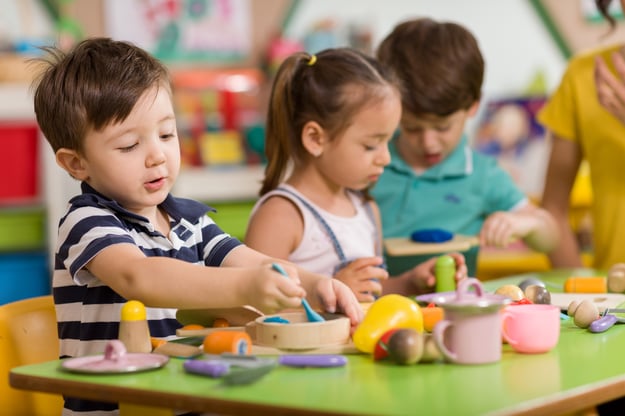
STEM Education Resources Teachers Actually Need in 2026
STEM brings together science, technology, engineering, and math in a connected way.
ALI Staff | Published March 18, 2024
The idea of a play-based curriculum may sound counterintuitive.
“Play” suggests giving children free rein to explore and discover based on their own interests and curiosities.
Some teachers may use it as a natural brain break in their classrooms and brief pause to academic instruction.
If we take that idea step further as a learning tool, play-based learning can become a driver of student engagement with additional child development goals in mind.
The play is still student-led but now guided by teachers with academic or social-emotional goals attached.
That doesn’t make it less engaging.
Play-based learning in preschool is still very fun, dynamic, and a great way to reach more of your youngest learners. Let’s take a closer look.

Play-based learning is an educational approach where children use play to develop skills, learn about new concepts, and explore content.
It emphasizes hands-on experiences, experimentation, and story-based learning.
While free play can be a component, a teacher in a play-based preschool can also guide students in a way that develops targeted skills.
For example, STEM for preschoolers is very much focused on tapping into students’ curiosities and wonderings with fun, hands-on activities that touch on the STEM fields. Engaging students is at the core of play-based learning.
Play is important in early childhood because young children learn through playing. Play also develops essential skills at an early age that go beyond cognitive and academic development. Children learn social and emotional cues from play, as well.
In this podcast with Bo Stjerne Thomsen, Vice-President and Chair of Learning through Play at the LEGO Foundation, we looked at the power of play as a more joyful way of learning. Learning through play can be your missing piece to engagement and academic achievement.
Here are a few key takeaways:
Play-based learning comes with a number of benefits that impact early childhood development and your students’ academic journey.
For preschool students, it can give them a positive first impression of school and set them up for success in later years. Let’s look at all of the benefits of play in classrooms a little closer.
Research shows that play-based learning develops cognitive, social-emotional, and academic skills in children.
It also has physical benefits in developing both fine and gross motor skills in young learners. P
lay is the most efficient way to reach students on a holistic level and develop skills for kindergarten and beyond.
Learning through play encourages a more active, hands-on exploration of the world. Our youngest students are already naturally curious.
Play uses that to motivate them to investigate, ask questions, and seek answers.
This is particularly powerful in STEM and developing skills children need as they move on in their school careers.
By engaging in play, whether it’s sensory free play or a more guided play-based activity, children tap into their creativity and imagination.
Role-playing scenarios and hands-on activities where they have to think outside the box to get to a desired outcome support innovation at their level. It may even lead students to discover things that weren’t even intended for that activity.
We’ve touched on social-emotional development already, but it’s important to highlight how important play is to positive social relationships.
Play-based learning gives children the opportunity to problem-solve, negotiate, and collaborate. Children learn how to resolve conflicts and develop perspective-taking skills through play.
The impact of play on more hands-on activities is obvious, but it also offers rich opportunities for growing students’ language and literacy skills.
Through play, children engage in conversations and storytelling, expanding their vocabulary, comprehension, and narrative skills.
These are all important to fluency and literacy, two content areas that touch every aspect of education.
The most powerful play-based curriculum in preschool is student-led, where students take the lead in their own learning experience. It’s also important to tap into students’ interests and curiosities.
With STEM activities, in particular, start by investigating wonderings your students already have about the world. They’ll feel more of a sense of ownership over those concepts.
Play-based learning is fun and engaging. It develops a more positive attitude toward learning in students that extends beyond those early years.
Children remember the joy and satisfaction of discovery and mastering new skills through play, which can lead to an intrinsic motivation to learn and persevere beyond preschool.
Play-based learning still requires teacher guidance, but it also requires educators to let go a bit of the structure they may be used to in the classroom.
There is value in letting children take ownership of their learning. It’s important that both teachers and parents see the value in play as a way to prepare students to meet more rigorous academic demands down the line.
Children who lose that spark for learning lose a drive for learning, and it can be harder to tap into that when they’re older.
Preschool is the best time to get students motivated to learn, excited to add to their knowledge base, and more engaged in school activities.

STEM brings together science, technology, engineering, and math in a connected way.

Mathematics can be a challenging subject for many students, requiring schools to have effective strategies in place to...

The news headlines are daunting. Math scores are down. School districts are scrambling to turn things around. And...